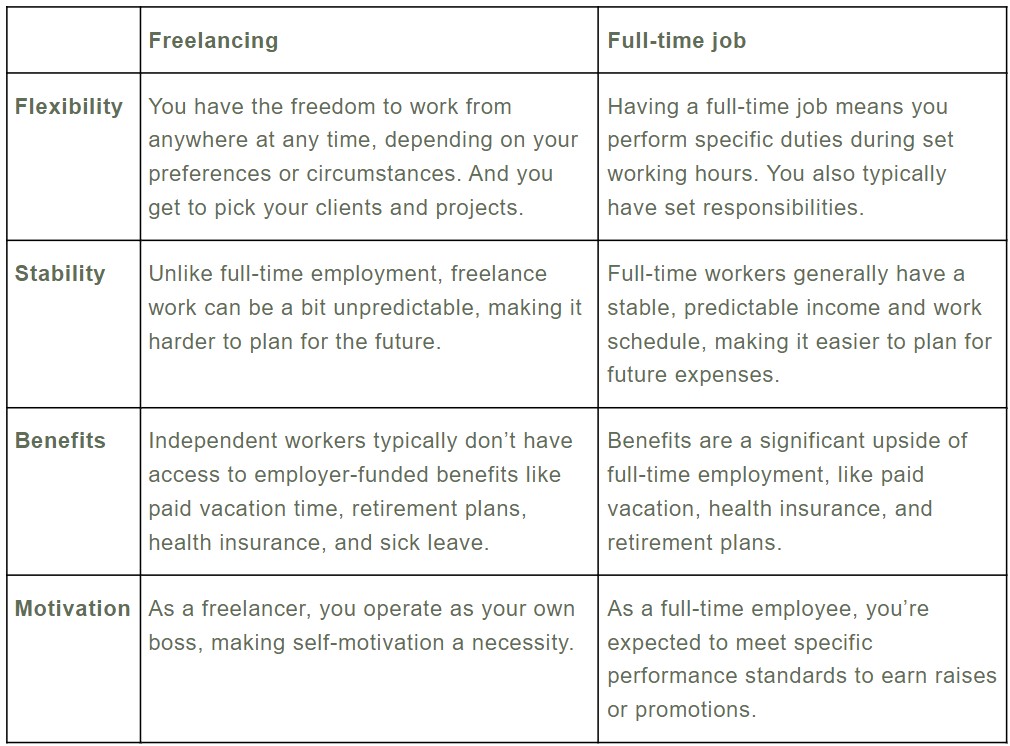Freelance Work: A Beginner’s Guide
Freelancers are independent contractors who earn their wages on a per-job, per-task basis. Freelance work is usually short term and can help a professional achieve a maintainable work/life balance; it also enables professionals to work across a wide range of industries instead of being limited to one or two industry sectors.
Overview: What is Freelance Work?
Freelance work, also known as contract work or gig work, is often found in creative, skills-based, and service industry sectors, like in writing, graphic design, and sales/marketing. Upwork, an online “marketplace that connects businesses with independent talent from across the globe”, provides an interactive resource for those considering freelancer work and the industries that type of work can be found in. As noted in the article, the nine industry sectors freelancing opportunities can be found include engineering & architecture, legal, human resources, finance & accounting, admin & customer support, writing & translation, sales & marketing, design & creative, and IT Development. Check out the specific job opportunities in each sector here: What is Freelancing? Basics and Popular Jobs.
In freelance work, the main responsibility is in completing the assigned task and/or job on time and in accordance with how the company wishes it to be done. Since freelancers often take on multiple projects with different companies simultaneously, it is incredibly important to be skilled in effective time management and organizational skills. While projects are often short-term assignments, delivering effective and efficient work can show the company you are a reliant freelancer they can call back for future jobs and tasks. However, freelance work is not just about delivering your best work on time; it is also about being highly self-reliant and independent.
Kat Boogaard, a freelancer writer who covers topics related to careers, self-development, and entrepreneurship, peels back the curtain on the reality of freelance work. She mentions in her ZipRecruiter article that “many prospective freelancers fail to think about the practical challenges that come along with making a living completely on your own. You need to pay your own taxes and fund your own retirement plan. You need to find health insurance. You need to manage the accounting and administrative duties yourself, or hire someone to do them for you. And, that’s all unbillable time—you need to do all of that while also completing high-quality client work that will actually pay your bills.” Not paying attention to the business side of freelancing responsibilities can really hinder the growth and success of a freelancer. Freelance professionals need to have equipped themselves with the skills necessary to be able to successfully compete with other freelancers, market themselves to their preferred industries, and grow as their own boss. Kat Boogaard is a prominent freelance writer with writing pieces published with Forbes, The Muse, Business Insider, and The New York Times to name a few. For those reading considering a career in freelancing writing, she offers valuable insight on her website, such as 6 Lessons From 6 Years of Full-Time Freelancing.

Benefits & Disadvantages of Freelance Work
Becoming a freelancer has many benefits that are coupled with disadvantages, like any professional career. Those who are new to the world of freelancing might want to consider how the benefits might outweigh (or not) the disadvantages that come along with it. Some of the benefits of freelancing include having the flexibility to choose your own hours, deciding when, where, and how long you should work each day. There is also more of a choice in choosing companies, projects, and clients that match interests and skill sets as well as more time to improve those skill sets as more projects and jobs come in.
Whereas, the disadvantages include potential career isolation, where day-to-day interactions with likeminded people might become scarce, job security is always up in the air and monthly earnings will fluctuate, and there are no employer-funded benefits such as healthcare or retirement offerings like 401(k). As a freelancer, all administrative responsibilities, such as legal paperwork, invoices, marketing, and bookkeeping fall on your shoulders. If you don’t have the means to hire out for those administrative duties, a disadvantage comes with how much unpaid time those duties will take up.
It might seem daunting, but for some, the benefits of freelance work might outweigh the disadvantages. For those considering a profession in freelance work, consider the chart designed by Upwork; flexibility, stability, benefits, and motivation are all important factors in deciding on taking any professional opportunity, and this chart provides a side by side comparison of freelancing versus being in a full-time job.

Marketing a Freelancing Business
If you’re still reading, there must be a deep interest in the idea of becoming a freelance professional. While it can be an intimidating career path to embark on, it can be fulfilling for both professional and personal reasons. As mentioned before, freelancing isn’t just about being good at a particular skill that lands you projects and gigs with companies. It is also about how you market your skills as a freelancing business. Marketing your skills to strangers can be an overwhelming task to complete if you’ve never done so before but it is an essential part of the freelancing business. For those who are just beginning their freelance career, it is encouraged to do the following marketing techniques to increase chances of growth and exposure. While there is much more to the world of marketing, these are summed up for the freelance beginner.
- Get a website up and running. A well-written, SEO driven website can do wonders for the exposure of a business. With free-web building tools readily available, you don’t need to have coding skills and a website does not have to be complex for it to be effective.
- Become familiar with email marketing. Once you start generating some leads for potential projects, it is important to keep in contact with those you’d want to know about your business and/or want to hire you. Email marketing is a direct way to reach those you know need and desire your skills/services.
- Build a network. You can read more about building one in the digital age here: Networking in the Digital Age
- Use social media consistently. Platforms like LinkedIn, Facebook, and Instagram can be places to find those who are interested or in need of your skill sets. They can also be great places to promote your freelancing business and gain traction with a wider audience.
- Ask for reviews. It can be awkward to ask former clients or brands to write a review for your business, but peer review testimonials are the best free marketing tool your freelancing could possibly have. Consumers are always more willing to use someone or something that a friend has recommended.
These five steps are just a starting point in getting the word out there about the work that you can provide to others through freelancing. Another overwhelming task when starting on a freelancing career is how to price the skills and services that are being provided. Pricing the services that your freelance work provides can also be hard to first figure out when just starting out. When making this decision, it is important to consider the value that your skills provide, whether long term or short term, that taxes and business expenses are factors in earning pay, and different clients might want different rates depending on the project. For those who are curious on the logistics of pricing your freelancing services, check out LinkedIn’s 2023 article How To Price Yourself as a Freelancer (and Why It Matters).
The Need for Continuous Learning
Freelance work can be an incredibly rewarding but challenging career path. Those who are seasoned in freelancing know how crucial it is to engage in continuous learning as well as keeping sharp the tech skills that make marketing and administrative business duties more effective. By investing in learning new skills and staying up-to-date with industry trends, freelancers position themselves as experts and attract high-paying clients. Continuous learning also helps freelancers anticipate future changes and adapt their services accordingly, ensuring long-term success in rapidly changing industries.
As an online tech vocational school, we offer nine different certificate programs that all speak to the need for freelancers to invest time into continuous learning…digital marketing, graphic design, web development, bookkeeping, and more. As your freelance journey continues and the need for upskilling evolves, consider DWC as your next choice in continuing education.
Free Webinar on How to Start A Freelance Business: May 20th
Interested in starting your own business but might not know where to start? We’re so excited to offer a free webinar featuring a few of our expert instructors who have built and grown their own successful freelancing careers. During this webinar, you’ll learn what you’ll need to do to set up the foundations of your business, including setting up an LLC and how to have productive and successful meetings with clients.

